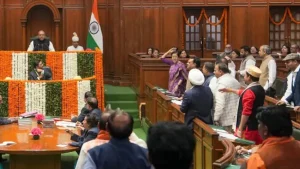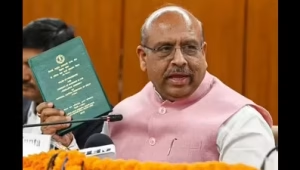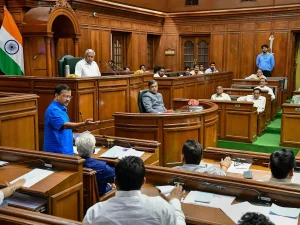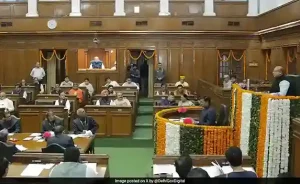New Delhi – The Delhi Legislative Assembly’s Rules Committee has moved a groundbreaking proposal to establish an Independent Secretariat for Delhi Assembly, marking a potential watershed moment in the legislative body’s administrative evolution. This comprehensive proposal, which includes provisions for financial autonomy, represents the most significant reform initiative since the Assembly’s establishment in 1993.
The Independent Secretariat for Delhi proposal has received in-principle approval from the Rules Committee, chaired by Speaker Vijender Gupta. Officials indicate that a formal resolution regarding this transformative Independent Secretariat for Delhi initiative is expected to be presented during the upcoming Monsoon Session of the Assembly.
Addressing Three Decades of Administrative Challenges
Since its constitution in 1993, the Delhi Assembly has operated without a dedicated secretarial cadre or financial independence, creating operational inefficiencies that have persisted for over three decades. The Independent Secretariat for Delhi proposal directly addresses these longstanding administrative challenges that have hampered the Assembly’s functional autonomy.

Unlike Parliament and State Legislatures, where Speakers maintain authority over appointments and administrative matters, the Delhi Assembly currently relies on officers deputed from various government departments. This dependency has created significant operational bottlenecks, making the case for an Independent Secretariat for Delhi even more compelling.
The absence of dedicated administrative infrastructure has curtailed the Assembly’s ability to function as an autonomous constitutional body, highlighting the urgent need for the proposed Independent Secretariat for Delhi reforms.
Also Read: Slums Demolition In Delhi: Shocking Mass Movement Planned Against BJP Government
Constitutional Framework Supporting Reform Initiative
The Independent Secretariat for Delhi proposal aligns with Articles 98 and 187 of the Constitution, which provide similar provisions for Parliament and State Legislatures respectively. This constitutional foundation strengthens the legal basis for establishing the proposed Independent Secretariat for Delhi structure.

Speaker Vijender Gupta, acknowledging the operational concerns, proposed the establishment of a separate Legislative Secretariat alongside financial autonomy for the Assembly. This Independent Secretariat for Delhi initiative represents a comprehensive approach to addressing administrative inefficiencies while ensuring constitutional compliance.
The constitutional provisions supporting the Independent Secretariat for Delhi proposal demonstrate that such administrative structures are not unprecedented but rather represent standard practice for legislative bodies across India.
Unique Position Among Union Territory Assemblies
Currently, three Union Territories maintain their own assemblies: Delhi, Puducherry, and Jammu & Kashmir. However, the Delhi Assembly occupies a unique position as the only one created as a constitutional body, distinguishing it from Puducherry and J&K legislatures, which are statutory bodies.
The Independent Secretariat for Delhi proposal recognizes this constitutional distinction and seeks to align the Assembly’s administrative structure with its constitutional status. While Puducherry and J&K legislatures were created under the Government of Union Territories Act, 1963, and Jammu and Kashmir Reorganisation Act, 2019, respectively, Delhi’s Assembly requires different treatment.
This unique constitutional status strengthens the argument for the Independent Secretariat for Delhi proposal, as it would bring the Assembly’s administrative structure in line with its constitutional standing.
Legislative Gaps and Proposed Solutions
Despite Delhi Assembly’s constitutional status, no provision for a separate Secretariat was made either in the Constitution or in the Government of NCT of Delhi Act, 1991. This legislative gap has created the administrative challenges that the Independent Secretariat for Delhi proposal seeks to address.
The absence of specific provisions for administrative autonomy in the founding legislation has necessitated the current Independent Secretariat for Delhi reform initiative. This gap between constitutional status and administrative reality has persisted for over three decades.
Officials emphasize that the Independent Secretariat for Delhi proposal would rectify this legislative oversight and provide the Assembly with the administrative tools necessary for effective functioning as a constitutional body.
Article 239 AA(b) and Amendment Pathway
The proposed Independent Secretariat for Delhi reforms find their legal pathway through Article 239 AA(b) of the Constitution, which empowers Parliament to regulate matters related to the functioning of the Delhi Legislative Assembly. This constitutional provision provides the mechanism for implementing the Independent Secretariat for Delhi proposal.
The Rules Committee’s recommendation for amending the GNCTD Act, 1991, would enable the formation of a separate Secretariat and grant financial autonomy to the Delhi Assembly. This amendment pathway ensures that the Independent Secretariat for Delhi proposal follows proper constitutional procedures.
The constitutional framework supporting the Independent Secretariat for Delhi initiative demonstrates that such reforms are not only legally viable but also constitutionally appropriate for the Assembly’s enhanced functioning.
Achieving Parity with State Legislatures


The Independent Secretariat for Delhi proposal aims to bring the Delhi Assembly at par with State Legislatures and the Union Territory of Jammu & Kashmir in terms of administrative autonomy. This parity is crucial for ensuring that Delhi Assembly can function effectively as a constitutional legislative body.
Currently, the Delhi Assembly lacks the administrative independence that State Legislatures enjoy, creating operational disparities. The Independent Secretariat for Delhi reforms would eliminate these disparities and establish institutional equality with other legislative bodies.
The parity achieved through the Independent Secretariat for Delhi proposal would enhance the Assembly’s capacity to serve Delhi’s citizens effectively while maintaining constitutional propriety.
Expected Implementation and Future Impact
Once implemented, the Independent Secretariat for Delhi proposal would mark a major step forward in ensuring institutional independence and effective functioning of the Delhi Assembly. This reform initiative represents the most significant administrative transformation since the Assembly’s establishment.


The Independent Secretariat for Delhi reforms would eliminate the current dependency on deputed officers from various government departments, creating a dedicated administrative structure. This change would significantly improve operational efficiency and reduce bureaucratic delays.
Officials anticipate that the Independent Secretariat for Delhi implementation would serve as a model for other Union Territory assemblies, potentially inspiring similar reforms across India’s diverse legislative landscape.
Final Word: A New Era for Delhi Assembly?
The Independent Secretariat proposal represents more than administrative reform; it embodies the Assembly’s evolution toward true institutional independence. This comprehensive initiative addresses three decades of administrative challenges while establishing a framework for enhanced legislative effectiveness.
The success of the Independent Secretariat proposal would demonstrate that constitutional bodies can adapt and evolve to meet contemporary governance challenges while maintaining their foundational principles and democratic responsibilities.

